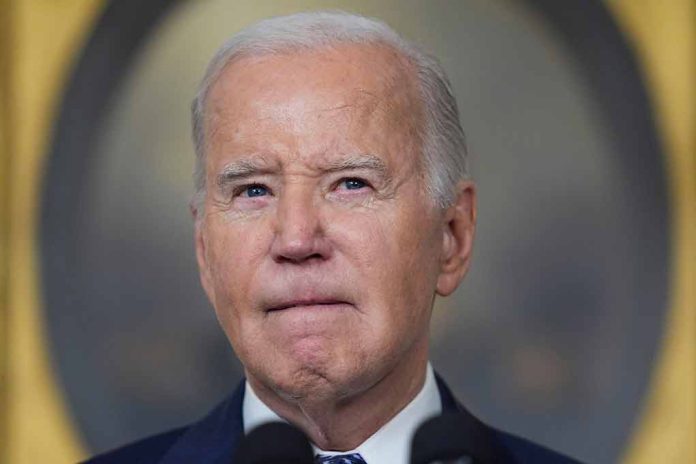
New evidence suggests Ethel Rosenberg may have been wrongfully executed for espionage in 1953, prompting calls for a posthumous pardon from President Biden.
At a Glance
- A declassified memo indicates Ethel Rosenberg was not actively involved in espionage
- Ethel and Julius Rosenberg were executed in 1953 for conspiring to steal atomic secrets
- Their sons are urging President Biden to posthumously exonerate their mother
- Historians debate Ethel’s level of involvement in her husband’s spy activities
New Evidence Casts Doubt on Ethel Rosenberg’s Guilt
A recently declassified memo from a top U.S. government codebreaker has reignited the debate surrounding Ethel Rosenberg’s role in one of the most controversial espionage cases of the Cold War era. The document suggests that while Ethel was aware of her husband Julius’ espionage activities, she “did not engage in the work herself.” This new information has prompted advocates, including Rosenberg’s sons, to pressure President Joe Biden for a posthumous pardon.
The Rosenbergs were executed in 1953 after being convicted of conspiring to steal atomic bomb secrets for the Soviet Union. Their case has long been a subject of debate, with many arguing that anti-communist sentiment of the time influenced the severity of the charges, particularly against Ethel.
Sons Push for Exoneration
Robert and Michael Meeropol, Ethel’s sons, have been fighting to clear their mother’s name for decades. The newly released memo, obtained through a Freedom of Information Act request, has given them renewed hope. Robert Meeropol expressed both relief and anger at the revelation, stating, “My brother and I are both relieved and angered to learn that the US government concluded that our mother, Ethel Rosenberg, was not a spy, seven months before her trial in 1951 and nearly three years before her execution in 1953.”
“This puts it on both sides of the Atlantic — in other words, both the KGB and the NSA ended up agreeing that Ethel was not a spy” Robert Meeropol said in an interview.
The brothers are urging President Biden to issue a presidential proclamation acknowledging that Ethel Rosenberg was wrongfully convicted and executed. They argue that this step is necessary to address what they view as a profound injustice and to align historical interpretation with present-day understandings of fairness and judicial integrity.
Family of Ethel Rosenberg say US document proves she was no Soviet spy. Fight to exonerate Ethel gets powerful boost. https://t.co/yn2H4OUEEt
— Anne Sebba (@annesebba) September 10, 2024
Historians Debate Ethel’s Role
While the new evidence has strengthened the case for Ethel’s exoneration, some historians maintain that she was not entirely innocent. Harvey Klehr, a historian who has extensively studied the case, argues, “Ethel may not have been a spy — that is, she might not have actually passed on classified information — but she was an active participant in her husband’s spy network, not just someone who happened to agree with her husband about politics”
This ongoing debate underscores the complexity of the case and the challenges in definitively determining Ethel’s level of involvement after so many years. However, the declassified memo provides significant support for those arguing that Ethel’s execution was unjust.
Historical Context and Implications
The Rosenberg case occurred during the height of Cold War paranoia, a time when fear of communist infiltration was at its peak in the United States. This climate likely influenced the trial and the harsh sentences handed down to both Julius and Ethel. President Eisenhower, in rejecting a final plea for clemency, stated, “I am convinced that the only conclusion to be drawn from the history of this case is that the Rosenbergs have received the benefits of every safeguard which American justice can provide.”
“When democracy’s enemies have been judged guilty of a crime as horrible as that of which the Rosenbergs were convicted: when the legal processes of democracy have been marshalled to their maximum strength to protect the lives of convicted spies: when in their most solemn judgement the tribunals of the United States has adjudged them guilty and the sentence just. I will not intervene in this matter.” – The Guardian
However, with the benefit of hindsight and new evidence, many now question whether justice was truly served in Ethel’s case. The potential posthumous pardon of Ethel Rosenberg would not only address a specific historical wrong but also serve as a reminder of the importance of maintaining due process and fairness in the justice system, even in times of national security concerns.
Sources:
- Declassified documents shed light on Ethel Rosenberg’s involvement in her husband’s Cold War spy case
- This article is more than 71 years old Execution of the Rosenbergs – archive, 1953
- Sons of executed spies Julius and Ethel Rosenberg ask Obama to exonerate their mother
- Julius and Ethel Rosenberg
- Execution of the Rosenbergs – archive, 1953
- Sons of Ethel Rosenberg plead with Obama to exonerate mother














